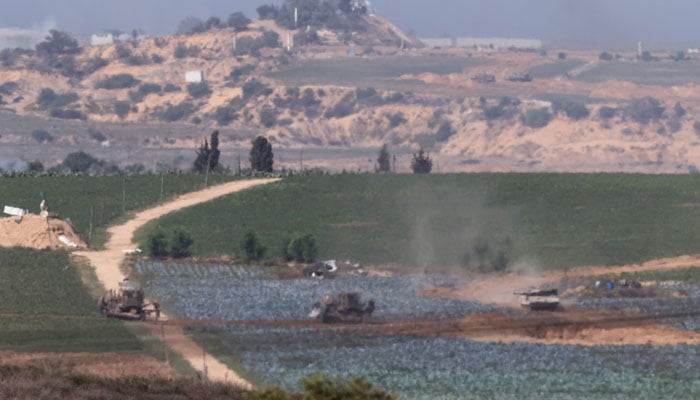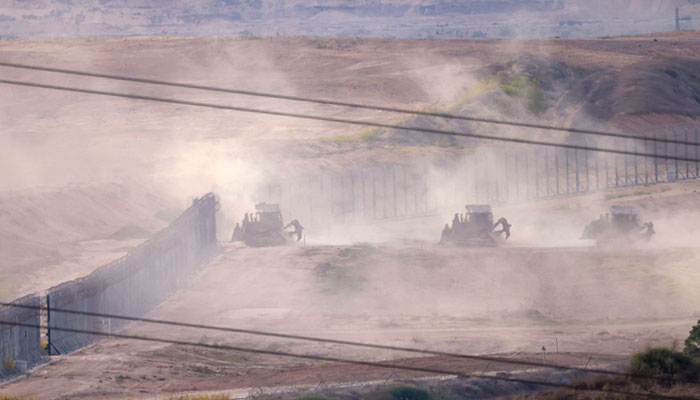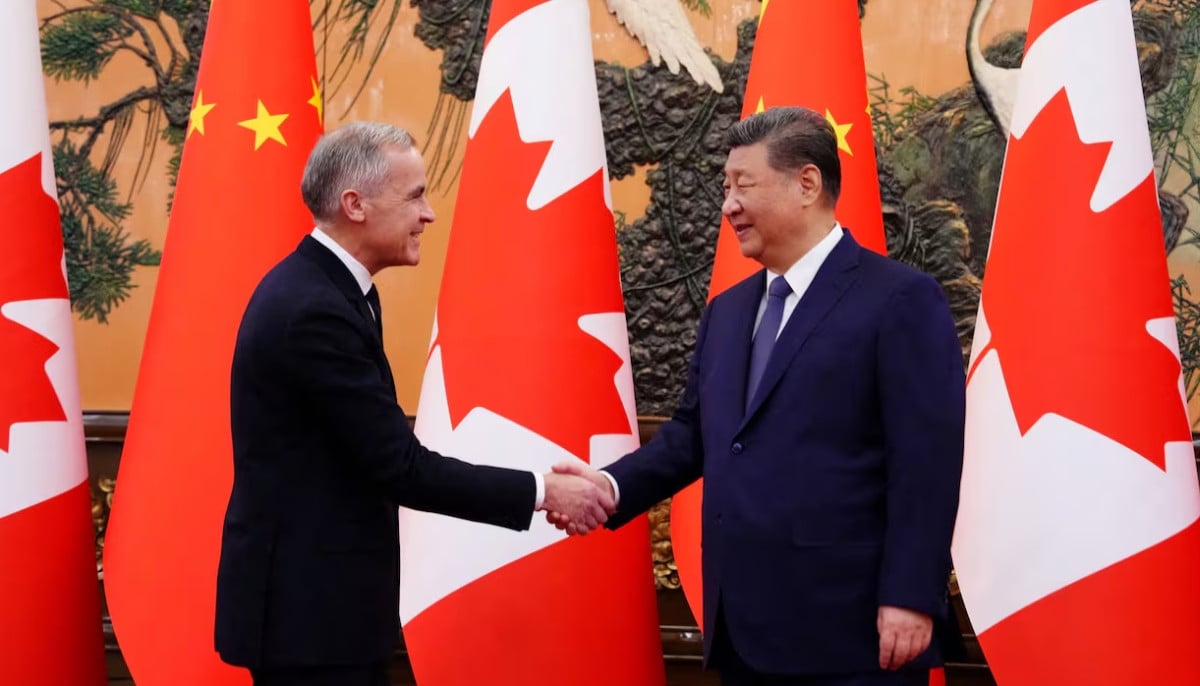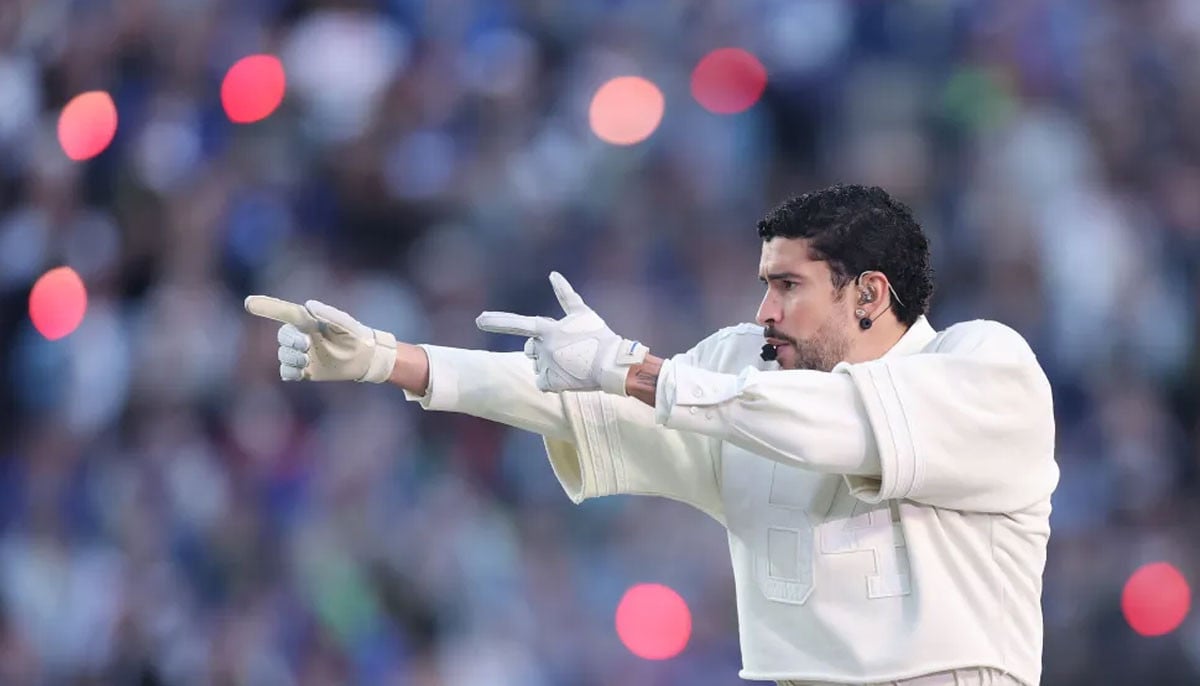Israeli tanks leave Gaza after fierce fighting, says Hamas
Panic and fear grip Gaza, where over a million residents are displaced and thousands of buildings destroyed
Israeli tanks that advanced into the fringes of Gaza City were forced to retreat after heavy clashes, according to the head of the Hamas government office in Gaza.
“There’s absolutely no ground advance inside the residential neighborhoods in the Gaza Strip. What happened on Salah al-Din Street was the incursion of a few occupation army tanks and a bulldozer,” Salama Maarouf said in a statement, Al Jazeera reported.
“These vehicles targeted two civilian cars on Salah al-Din Street and bulldozed the street before the resistance forced them to retreat.
"There is currently no presence of occupation army vehicles on Salah al-Din Road, and citizen movement has returned to normal on the road.”
Israeli troops backed by tanks attempted to press into northern Gaza earlier today, conducting intense air and artillery strikes on Palestinians amid louder international calls for civilian protection.
The strikes targeted areas near Gaza City's Al-Shifa and Al-Quds hospitals, while Hamas fighters clashed with Israeli forces in a border area east of Khan Younis, according to Palestinian media.
After the Israeli government ordered additional ground incursions across Gaza's eastern border two days earlier, the Israeli government released photographs of war tanks on the western coast of the Palestinian enclave, hinting at a possible attempt to surround the city. This was followed by the bombardment of Gaza for many hours.
Israel's army said a new "stage" of the war started with ground incursions since late Friday, an escalation from two brief operations earlier in the week. However, this phase has largely been kept from public view, with forces moving under darkness and a telecommunications blackout cutting off Palestinians.
According to AFP, telecommunication cuts appeared to ease on Sunday but had severely hampered rescue operations for casualties of Israeli barrages.
Israeli tanks destroy road in Gaza Strip
Israeli tanks entered Gaza City's edge on Monday and cut a key road that linked northern and southern Gaza, according to witnesses, as Israel expanded its ground incursions in the region, AFP reported.
The witnesses said that they saw tanks in the Zaytun district, since Israeli forces stepped up a ground offensive in recent days as part of its military response to the October 7 Hamas attacks, vowing to topple Gaza's resistance.
"They have cut the Salahedin road and are firing at any vehicle that tries to go along it," said one resident.
Israeli pounds Syrian military infrastructure
Israel's army said Monday it carried out air strikes on military infrastructure inside Syria as fears grow that its war against Hamas could spur a broader regional conflict.
"A short time ago, an IDF fighter jet attacked the launchers" from where overnight attacks originated towards Israeli territory, the military said, indicating it hit "military infrastructure in Syrian territory".
The army did not provide more details, but public broadcaster Kan News said the strikes hit near the southern city of Daraa.
Syria's defence ministry said Monday Israel struck at around 1:35am (2235 GMT) "from the direction of the occupied Syrian Golan, targeting two positions of our armed forces in the Daraa countryside, causing some material losses".
The Syrian Observatory for Human Rights reported that Israel targeted an artillery battalion in Daraa province in response to shelling on Golan Heights, with Hezbollah-linked Syrian and Palestinian groups behind rocket attacks, raising concerns about regional fallout from Israel's war on Hamas.
Late Sunday, the Israeli military said it was striking "Hezbollah terrorist targets in Lebanon" in response to rocket fire.
Intensifying clashes on the Israel-Lebanon border have killed at least 62 people in Lebanon according to an AFP tally — 47 of them Hezbollah fighters but also including four civilians, one a Reuters journalist.
Israeli officials have reported at least four deaths, including one civilian.
Nearly 29,000 people have been displaced in Lebanon due to the skirmishes, according to the International Organisation for Migration.
Israel hits 600 Hamas targets
Israeli forces killed "dozens" of Hamas fighters in overnight clashes in Gaza, the military said Monday as it presses its hardline response to the October 7 Hamas attacks.
Hamas also reported "heavy fighting" in northern Gaza on the third night of Israel's expanded ground raids into the war-torn territory with tanks and troops.
The army said, "Troops killed dozens of terrorists who barricaded themselves in buildings and tunnels and attempted to attack the troops".
In one incident, a fighter jet targeted a building "with over 20 Hamas terrorist operatives inside," the military said. In another, a fighter jet was guided to an anti-tank missile launching post in the area of Al-Azhar University.
Al-Azhar is in the heart of Gaza City which has been the focus of Israel's attacks since the start of its campaign after the Hamas attacks.
The army said it has struck "over 600 terror targets, including weapons depots, dozens of anti-tank missile launching positions, as well as hideouts and staging grounds used by the Hamas terrorist organisation" in recent days.
Evacuation warnings to Al Quds, Al Shifa Hospital
The reported strikes near hospitals came after the Palestinian Red Crescent Society (PCRS) said on Sunday that it had received warnings from Israeli authorities to immediately evacuate al-Quds hospital, where some 14,000 people have sought shelter.
Mohamed al-Talmas, who has taken shelter in Gaza's biggest hospital Shifa, said "the ground shook" with intense Israeli raids.
"No one knew where they (strikes) were coming from — north, south, east or west."
Israel has accused Hamas of locating command centres and other military infrastructure in Gaza hospitals, something the group denies.
Palestinian officials said around 50,000 people had also taken shelter in Shifa Hospital, adding that they were concerned about ongoing Israeli threats to the facility.
Israel has tightened its blockade and bombarded Gaza since Hamas gunmen stormed across the border into Israel on October 7, killing some 1,400 people and taking at least 239 hostages, according to Israeli reports.
Meanwhile, as a result of Israeli retaliatory strikes, over 8,000 Palestinians have been martyred including more than 3,000 children.
Panic and fear have surged inside the Palestinian territory, where the UN says more than half of its 2.4 million residents are displaced and thousands of buildings destroyed.
Hamas's armed wing, the Ezzedine al-Qassam Brigades, said on Sunday its fighters were "engaged in heavy fighting... with the invading occupation (Israeli) forces in northwest Gaza".
Aid 'acceleration'
In a phone call with Israeli Prime Minister Benjamin Netanyahu on Sunday, US President Joe Biden "underscored the need to immediately and significantly increase the flow of humanitarian assistance to meet the needs of civilians in Gaza", according to a readout of the conversation from the White House.
Additionally, in a separate call with President Abdel Fattah al-Sisi of Egypt, which borders Gaza to the south, the two leaders "committed to the significant acceleration and increase of assistance", the White House said.
UN chief Antonio Guterres said the situation was "growing more desperate by the hour" as casualties increase and essential supplies of food, water, medicine and shelter dwindle.
The UN agency for Palestinian refugees, UNRWA, warned that "civil order" was starting to collapse as "thousands of people" broke into several of its warehouses and distribution centres in Gaza, grabbing basic items like flour and hygiene supplies.
"This is a worrying sign that civil order is starting to break down," it said.
A US government official, speaking on condition of anonymity, said earlier Israel was committed to allowing 100 aid trucks into Gaza daily — a figure the UN has said was needed to meet the most basic needs.
US urges Israel to protect Gaza civilians
The bloodshed saw the Biden administration warn Israel on Sunday that it must protect civilian lives.
While the US ally has the right to defend itself, it must do so "in a manner consistent with international humanitarian law that prioritises the protection of civilians," Biden told Netanyahu in a phone call, the White House said.
He spoke after his national security adviser, Jake Sullivan, told CNN that Israel "should be taking every possible means available to them to distinguish between Hamas — terrorists, who are legitimate military targets — and civilians, who are not."
Moreover, Britain's Prime Minister Rishi Sunak and French President Emmanuel Macron "stressed the importance of getting urgent humanitarian support" into the Palestinian territory.
Sunak and Macron spoke by telephone and "agreed to work together on efforts both to get crucial food, fuel, water and medicine to those who need it and to get foreign nationals out," said a Downing Street spokesperson.
On social media, Macron reiterated a call for a humanitarian truce.
"17 tons of humanitarian freight have arrived in Egypt from France. We are continuing our efforts by air and sea... alongside Egypt and the Red Crescent," he said.
Earlier, Guterres said he regretted that "instead of a critically needed humanitarian pause, supported by the international community, Israel has intensified its military operations."
"The world is witnessing a humanitarian catastrophe," Guterres added on a visit to Nepal's capital Kathmandu. "I urge all those with responsibility to step back from the brink."
Working to free hostages
Though the US remains Israel's strongest ally, the Biden administration has insisted that Israeli leaders alone decide its military operations and publicly multiplied appeals to spare the lives of Palestinian civilians.
The White House also revealed Sunday that it had "worked on" bids to turn communications in Gaza back on.
The restoration of communications was "critical," the official White House account posted on X, formerly Twitter.
"Aid workers, civilians, and journalists need to be able to communicate with each other and the rest of the world. Our Administration cared about this, worked on it, and are glad to see it restored," the post continued.
Sullivan, speaking on ABC's "This Week" as he made a round of Sunday talk shows, slammed Hamas's own treatment of civilians, calling them a "brutal terrorist organisation" that is "hiding behind the civilian population."
"But it doesn't lessen their (Israel's) responsibility under international humanitarian law and the laws of war to do all in their power to protect the civilian population," he said.
Sullivan also said that US officials are working to help secure the release of more than 220 hostages being held in Gaza by Hamas, as well as to help the hundreds of Palestinian Americans stuck in Gaza.
'All areas are dangerous'
Israel's military said Sunday that it had struck hundreds of Hamas targets and increased its ground forces in Gaza. Military spokesman Hagari vowed to "chase down" Hamas's leader in Gaza, Yahya Sinwar.
The army said troops had "confronted" Hamas fighters who emerged out of a tunnel in north Gaza, highlighting challenges in Hamas's vast underground network to Israel's ground operation.
In a late-night televised address on Saturday, Netanyahu announced a "second stage of the war" to "eradicate" Hamas, which has governed Gaza since 2007.
Communications were down in Gaza after Israel cut internet lines ahead of the intensification of its operations, although connectivity was gradually returning on Sunday.
The "burden" lies with Israel to distinguish between Hamas and innocent civilians in Gaza, US National Security Advisor Jake Sullivan told CNN television.
Hagari again urged Palestinian civilians to go south "to a safer area", but residents remained wary as airstrikes continued.
Ibrahim Shandoughli, a 53-year-old from Jabaliya in northern Gaza, told AFP he and his family went nowhere.
"Where do you want us to evacuate to? All the areas are dangerous."
-
Alan Cumming shares plans with 2026 Bafta Film Awards
-
OpenClaw founder Peter Steinberger hired by OpenAI as AI agent race heats up
-
Chinese New Year explained: All you need to know about the Year of the Horse
-
Canadian passport holders can now travel to China visa-free: Here's how
-
Edmonton weather warning: Up to 30 cm of snow possible in parts of Alberta
-
ICE agents 'fake car trouble' to arrest Minnesota man, family says
-
China confirms visa-free travel for UK, Canada nationals
-
Bad Bunny's star power explodes tourism searches for his hometown













